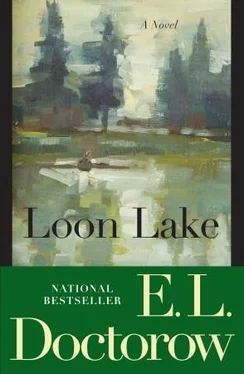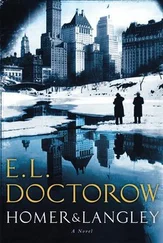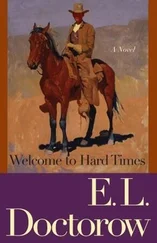“You’re a hero,” she said, smiling. She dropped the medal in his lap and then raised her glass to her lips.
“No, but, love, you haven’t heard the end.” He dropped his chin to his chest. “I was so terrified I didn’t send the message I was supposed to. What I semaphored was the first verse of a poem.”
“What?” I said.
“‘There was a time when meadow, grove, and stream, The earth, and every common sight, To me did seem Apparelled in celestial light, The glory and the freshness of a dream,’ and so on,” he said. “And a while later the shells came in on target. It was very strange.”
She was laughing. “In the war — in the battle?”
“Surely you know it,” he said. “The Intimations Ode? Didn’t you have it in school?”
“But why?”
“I don’t know why. Maybe I thought I was going to die. Maybe it seemed to me the only appropriate thing to say. Anyway, after I got the medal I wrote a letter to the Secretary of the Army returning it and telling him it was more properly William Wordsworth’s.”
“But it wasn’t a medal for poetry,” I said, and immediately felt like a fool.
“Apparently not, Joe of Paterson. Apparently not. I had to go for psychiatric tests. They pinned the medal on my bathrobe. They kept me under observation for ninety days in Nutley, New Jersey.”
“Where?” she said, happily laughing. He looked up at her, victorious in her amusement. “Oh, Warren, you old fuck, where?” She threw back her head and laughed and laughed, I gazed at her throat, her neck, it was a moment in which I could look at all of her as she sat in her white satin robe, she bending forward now in her laughter, the robe unfolding like unfolding wings so that I could see her breasts.
Then I realized Penfield was looking at me, with his head lowered, with raised eyebrows, a characteristic expression, I knew at once, full of sadness, full of self-acknowledgment, and as she reached out and touched his head he too began to giggle, he was in love with her, and soon they were both laughing and I was laughing, but trying not to for some reason, feeling badly that I laughed, feeling ashamed.
I hadn’t realized how drunk they were. A few moments later, in silence, she put her glass down and reached out, holding his head in her arms. He looked up at her, and behind her shingle of hair he kissed her, his hand with the bottle going up involuntarily, another semaphore, and I heard her sob, and then both of them were crying.
I tried to leave, but they wouldn’t allow it. All at once they were very physical with me, placing themselves on either side of me and leading me back to the middle of the room. Penfield went to stoke up the fire. She led me to my chair and pressed my shoulders firmly with her small hands and then sat across from me and studied me solemnly. Until this moment her primary awareness had been of Penfield, she had not quite acknowledged me, as if one person at a time, and only one, could occupy her mind. She was always to be this way, intense and direct with whatever she fixed upon, and whatever the affront to those on the periphery. It was not snobbishness or anything like that — she was in fact reckless of her self-interest in a situation, and that I think was the center of her force and effect. She knew nothing about courtesy in the sense of not being subject to it. She blazed through her feelings and suffered the consequences.
I began to realize as we talked that she was no older than I was. I was stunned — I was not yet twenty — I equated power and position in the world with age.
“You live here?” she said. “How do you stand it?” I rubbed my palms on my knickers. I looked with alarm at Warren Penfield, who said, “Clara, he’s my surprise for you,” and came back to his place on the floor.
She had a throaty voice with a scratched quality. Her diction was of the street. “Whats ’at mean!” She gazed at me, her eyes widening, and I was certain, as if a chasm were opening around me, that she was as fraudulent in this place as I was. I drank off my wine.
“You remember the night you heard the dogs?” the poet said to her, and leaned forward to refill my glass. “Joe here is taking each day as it comes — like you, Clara.”
I saw realization light her eyes. She went to the fire and sat down before it with her back to us. I don’t remember much of what happened after that. I drank more than I should have. The fire looming her shadow across the low-ceilinged room. Later we heard the rain falling, a heavy rain that seemed to do something to the draught. Wood smoke came into the room on gusts. At this point we were all standing, I had removed my shirt, and she was tracing the scars on my chest and arms and neck with her fingertips.
I could smell her, the soap she used, the gel of her hair. The firelight flared on our faces as if we were standing with the poet in his war.
“He told me it was a deer, that they took a deer,” she said. “That was a lie.”
“Yes,” Penfield said, watching her fingers.
“What class,” Clara said. Tears were suddenly coming down her cheeks.
“I could help you leave,” Penfield said. His eyes closed and he began moving his head from side to side like someone in mourning. “I can get you out of here. We can leave together.” His sentences became a hum, a soft keening, as if he were listening to some private elegy and had no hope of an answer from her.
“That son of a bitch,” she said with the tears streaming. “I wouldn’t give him the satisfaction.”
Certain contracts having quietly been made in mountains
certified convicts having mislaid their companions
I direct you eight hundred Mercator miles west
to the autobody works on the flat landscape
dawn whitening the frost on the corrugated shed roofs
the smokeless stacks the endless chain-link fence
the first trolley of the morning down Division Street
discharges workers in caps and open jackets but not workers.
The pickets roused from their sleep huddled by steel-drum fires
the cops awakened in their cars rubbing their misted windshields
the second trolley of the morning tolls down Division Street
discharges workers or workers at first glance
but somehow not resembling the strikers grouping uneasily
in front of the main gates of the autobody works.
The cops make calls from phoneboxes on the corners
the third trolley of the morning grinding its flanged wheels
on Division Street stopping the arrivals stepping down now
seen in the light their expressions of newly purchased loyalty
appearing as an unaccustomed cause in their shrewd appraising eyes
the insignia of their dereliction, jackets with pockets of pints
shoes tied around with rope, medals of filth,
mercenaries with callused fingers discovering
the cobblestones pried so easily
by ones and twos and hefted as many as until the tracks
of the trolleys of Division Street stand up from unpaved beds.
Open trucks arrive filled with the faces not of workers.
This army can take the city apart and put it back together
if it so wishes or perhaps wrap the electrified lines
stringing the utility poles overhead around each individual striker
until he may go self-powered into eternity.
Cops start patrol-car engines drive quietly away
certain black sedans now arrive between arrivals
of the crowded streetcars and trucks some men in overcoats appearing
among the seeming workers resembling only slightly now the pickets
with the eyes of lepers staring at them
no saints present on this wet gray morning to kiss them,
so numerous now they do not even have to look at whom they will face
Читать дальше











